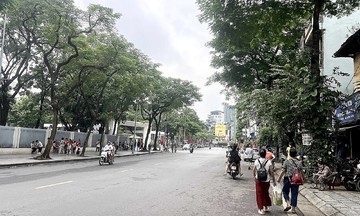Gong Lingjun, a bakery owner in Chongqing, hosts his 16 nieces and nephews every summer and Lunar New Year holiday. His three sisters and one younger sister have a combined total of 16 children. "Initially, the kids came over because their parents were busy, but now it's a family tradition," Gong said.
 |
Gong has to go to the market every day with a shoulder pole to buy food for his nieces and nephews. Photo: Worldjournal |
Gong has to go to the market every day with a shoulder pole to buy food for his nieces and nephews. Photo: Worldjournal
The biggest challenge is feeding everyone. On the first day, Gong bought half a pig, vegetables, and various other groceries, carrying them home as if he had "bought out the entire market." Including Gong, his wife, and their two children, the family spends 700-1,000 CNY on food daily, plus another 500-700 CNY on late-night snacks.
"My home is like a school cafeteria. We have three meals a day, four tables per meal, and it takes several hours to cook," Gong explained. He even has to take attendance at mealtimes to ensure no one is missing.
Each nearly two-month summer break costs around 60,000 CNY, excluding gifts, the cost of running 5 air conditioners constantly, and other incidental expenses.
The shorter winter break costs 20,000-30,000 CNY.
 |
Wang's nieces and nephews range in age from kindergarten to 18. Photo: Worldjournal |
Wang's nieces and nephews range in age from kindergarten to 18. Photo: Worldjournal
Despite the cost and effort, Gong doesn't mind because he wants his nieces and nephews to be close. The oldest is 20, while the youngest is in kindergarten. The age gap between Gong and his oldest niece or nephew is only 12 years, making their relationship almost like friends.
He organizes their days with a structured schedule: morning jogs, homework during the day, and trips to the night market in the evening. They also have game nights, cooking competitions, and shared chores. Under Gong and his wife’s guidance, the children have learned to cook, make their beds, and clean the house and dishes.
Looking through photo albums and videos, Gong sees his nieces and nephews growing up. In 2021, a shy niece brought him her first batch of homemade cookies. In 2023, his nephews pooled their money to throw him a surprise birthday party.
"I save these memories in a 'Growing Up Album' for our extended family," he shared.
According to Professor Wang Fang of the Chinese Academy of Social Sciences, Gong's "family summer camp" is a vivid example of familial love, something that's fading in modern urban society.
"The percentage of only children in China born after 2000 is 75%. Lacking siblings deprives children of the environment to develop social skills, learn to share, and resolve conflicts," Wang said.
Professor Li Ming of East China Normal University calls this a "natural education model." Children learn principles, skills, and creativity from real-life situations, something classrooms can't teach.
 |
The nieces and nephews crowd the living room every night. Photo: Worldjournal |
The nieces and nephews crowd the living room every night. Photo: Worldjournal
Gong acknowledges that as the children grow up, the family may not gather like this forever, so he cherishes each summer they spend together. "Every year they get taller and more mature. This feeling of happiness is priceless," he said.
Each time they part, the younger children shout, "We'll be back!".
The uncle, though saddened, smiles, knowing that "after summer ends, I'll go back to earning money because they'll definitely be back again."
Bao Nhien (Via Worldjournal/163)












